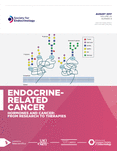WOMEN IN CANCER PROFILE: A gender agenda?
- Department of Surgery & Cancer, Imperial College London, London, UK
- Correspondence should be addressed to C L Bevan; Email: charlotte.bevan{at}imperial.ac.uk
Growing up, I never understood why so many people professed to have no interest in science. How could understanding how things work not be the most fascinating thing? And how we, as organisms, develop and function (or fail to) seemed to me the most fascinating thing of all. One of my most inspiring school teachers was the head of Biology, Dr Chris Haworth, who undertook to nurture my ambition to gain a place at ‘Oxbridge’ (no one from our comprehensive school in the far north of England had previously gone to either Cambridge or Oxford). I remember one lesson in which we came in to find dandelion leaves strewn around the room. It turned out they were all different, representing a fair proportion of the 250-odd species of dandelion on which, had I but appreciated it at the time, Dr Haworth was a recognised authority. Although many of my classmates flatly refused to see any difference between the leaves, it was my first introduction to genetic diversity. And speaking of diversity, I wanted to keep my options open so crammed in as many A level subjects as I could, from Applied Mathematics to English Literature, refusing to drop any despite the recommendations by career advisers and admission tutors.
This reluctance to specialise early made the Natural Sciences Tripos at Cambridge attractive to me, and I applied to Kings College. I knew very little about the colleges and picked Kings on the basis of its informality (no gowns required), beauty – and the fact that they gave me a free lunch when I went to visit. During my interview, I was asked to talk about any aspect of science that currently interested me (that will sound familiar to anyone who has been interviewed by me). As luck would have it, a …












